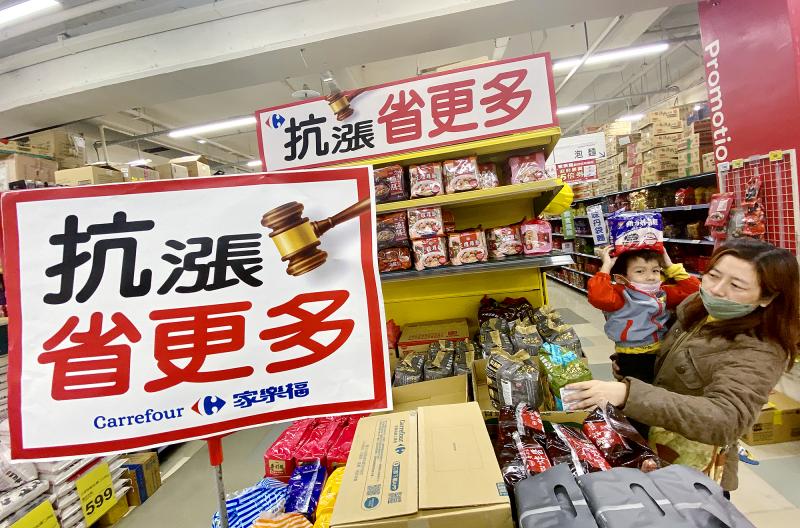Consumer prices last month rose 2.62 percent from a year earlier — the seventh time it climbed above the 2 percent alert level last year — as fuel, food and other consumption categories all became more expensive, the Directorate-General of Budget, Accounting and Statistics (DGBAS) said yesterday.
The statistics agency reiterated that inflation would taper off after the Lunar New Year, even though CPI readings for the entire second half of last year defied its predictions of a slowdown.
“The inflationary pressures are indeed building up, but could have plateaued last quarter and would ease off this year quarter on quarter,” DGBAS official Tsao Chih-hung (曹志弘) said, citing international research bodies.

Photo: CNA
Government officials have painted ongoing inflation as “transient and imported” due mainly to spikes in fuel and raw material prices, although almost all sectors — from wholesalers to retailers, restaurants, garment makers and property developers — have raised prices to reflect soaring cost burdens.
The consumer price index would stay above the 2 percent mark this quarter, but would trend down thereafter, Tsao said, mainly due to base effects.
Transportation prices climbed 5.08 percent on the back of a 19.55 percent increase in international fuel prices and a 14.08 percent upswing in domestic airfares, it said.
Food costs gained 4.23 percent, as bad weather pushed up prices for fruit by 21.61 percent and eggs by 11.75 percent, it said, adding that meat prices grew 5.49 percent and vegetable prices rose 3.36 percent.
Nelson Chang (張安平), chairman of Taiwan Cement Corp (台灣水泥) and chief executive of L’Hotel de Chine Group (雲朗觀光), yesterday said that he could not figure out why governments around the world refused to recognize inflation and reverse their loose monetary policy, the cause of stock rallies and inflation.
“I don’t like the current economic cycle where everything grows more expensive — including financial assets, real-estate properties, raw materials and labor costs, while coronavirus infections escalate,” Chang told a public function in Taipei.
In the meantime, labor and material shortages persist, because people do not want to work, he said.
Recreational and educational facilities hiked prices by 2.03 percent, while garment makers increased prices by 1.57 percent, despite lackluster business, the DGBAS said.
Living costs rose 1.55 percent due to higher prices for house repair, household items and rents, it said.
The wholesale price index (WPI), a measure of production costs, increased 12.25 percent, it said.
For the whole of last year, CPI advanced 1.96 percent, the fastest in 13 years, while WPI grew 9.42 percent, the highest in 41 years, it said, attributing the pace to unfavorable bases.

In Italy’s storied gold-making hubs, jewelers are reworking their designs to trim gold content as they race to blunt the effect of record prices and appeal to shoppers watching their budgets. Gold prices hit a record high on Thursday, surging near US$5,600 an ounce, more than double a year ago as geopolitical concerns and jitters over trade pushed investors toward the safe-haven asset. The rally is putting undue pressure on small artisans as they face mounting demands from customers, including international brands, to produce cheaper items, from signature pieces to wedding rings, according to interviews with four independent jewelers in Italy’s main

Japanese Prime Minister Sanae Takaichi has talked up the benefits of a weaker yen in a campaign speech, adopting a tone at odds with her finance ministry, which has refused to rule out any options to counter excessive foreign exchange volatility. Takaichi later softened her stance, saying she did not have a preference for the yen’s direction. “People say the weak yen is bad right now, but for export industries, it’s a major opportunity,” Takaichi said on Saturday at a rally for Liberal Democratic Party candidate Daishiro Yamagiwa in Kanagawa Prefecture ahead of a snap election on Sunday. “Whether it’s selling food or

CONCERNS: Tech companies investing in AI businesses that purchase their products have raised questions among investors that they are artificially propping up demand Nvidia Corp chief executive officer Jensen Huang (黃仁勳) on Saturday said that the company would be participating in OpenAI’s latest funding round, describing it as potentially “the largest investment we’ve ever made.” “We will invest a great deal of money,” Huang told reporters while visiting Taipei. “I believe in OpenAI. The work that they do is incredible. They’re one of the most consequential companies of our time.” Huang did not say exactly how much Nvidia might contribute, but described the investment as “huge.” “Let Sam announce how much he’s going to raise — it’s for him to decide,” Huang said, referring to OpenAI

The global server market is expected to grow 12.8 percent annually this year, with artificial intelligence (AI) servers projected to account for 16.5 percent, driven by continued investment in AI infrastructure by major cloud service providers (CSPs), market researcher TrendForce Corp (集邦科技) said yesterday. Global AI server shipments this year are expected to increase 28 percent year-on-year to more than 2.7 million units, driven by sustained demand from CSPs and government sovereign cloud projects, TrendForce analyst Frank Kung (龔明德) told the Taipei Times. Demand for GPU-based AI servers, including Nvidia Corp’s GB and Vera Rubin rack systems, is expected to remain high,